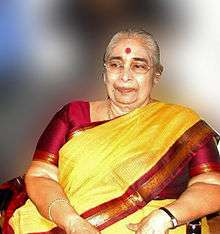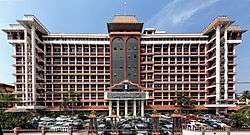K. K. Usha
| Hon'ble Justice Justice K.K. Usha | |
|---|---|
 | |
| Chief Justice Kerala High Court | |
|
In office 2000–2001 | |
| Preceded by | Arvind Vinayakarao Savant |
| Succeeded by | B. N. Srikrishna |
| Judge Kerala High Court | |
|
In office 1991–2000 | |
| Personal details | |
| Born |
3 July 1939 Thrissur, Kerala, India |
| Citizenship | Indian |
| Nationality |
|
| Spouse(s) | Justice K. Sukumaran |
K. K. Usha (born 3 July 1939) is a former Chief Justice of the Kerala High Court, India.
Formal career
K. K. Usha enrolled as an advocate in 1961. She was appointed Government pleader in the Kerala High Court in 1979.[1] She was a judge and then Chief Justice in the high court from 25 February 1991 to 3 July 2001.[2] She was the Chief Justice from 2000 to 2001.[3] She was the first woman to join the high court from the bar and to become a Chief Justice. After retiring from the high court, from 2001 to 2004 she was President of the Delhi-based Customs, Excise and Service Tax Appellate Tribunal.[1]
Other activities
In 1975, K.K. Usha represented India at the International Convention of the International Federation of Women Lawyers in Hamburg, Germany. She was India's representative at the United Nations' Joint Seminar on "Convention on the elimination of all forms of discrimination as regards women" organised by the International Federation of Women Lawyers and the International Federation of Women of Legal Careers. She was a member and the President of the University Women's Association. She is involved in "Sree Narayana Sevika Samajam", an orphanage and home for destitute women in Trivandrum.[1]
Between January 2005 and October 2006, K. K. Usha headed an enquiry by the Indian People's Tribunal (IPT) to investigate the communal situation in Orissa.[4] Activists from the Sangh Parivar disrupted the final hearing in Bhubaneswar. Angana P. Chatterji, a member of the tribunal, alleged that Hindu nationalist activists threatened to rape tribunal members and to parade them naked in the streets.[5] K. K. Usha and fellow tribunal member R.A. Mehta, a former Acting Chief Justice of the High Court of Gujarat, called the incident "shocking, outrageous and highly deplorable".[6] In December 2011, K. K. Usha was a member of an IPT panel on human rights issues in Manipur. The panel, sitting in Imphal, heard testimony about more than forty cases of extrajudicial killings and other human rights violations over a five-year period. It recommended repeal of the Armed Forces (Special Powers) Act in the state.[7]
References
- 1 2 3 "Chief Justice KK Usha". Kerala Women. Archived from the original on 5 March 2012. Retrieved 20 April 2012.
- ↑ "Former Judges". High Court of Kerala. Retrieved 20 April 2012.
- ↑ "COMMUNALISM IN ORISSA" (PDF). Indian People's Tribunal on Environment and Human Rights. September 2006. ISBN 81-89479-13-X. Retrieved 20 April 2012.
- ↑ Angana Chatterji (20 March 2012). "To: The Tom Lantos Human Rights Commission" (PDF). Retrieved 19 April 2012.
- ↑ Williams, Mark; Pocha, Jehangir (23 June 2005). "S.F. professor fears Hindu retaliation". San Francisco Chronicle. Retrieved 19 April 2012.
- ↑ Das, Prafulla (15 June 2005). "Sangh Parivar activists disrupt tribunal hearing". The Hindu. Retrieved 19 April 2012.
- ↑ "Tribunal seeks act repeal - 'Independent' panel wants AFSPA to go". the Telegraph. 19 January 2011. Retrieved 20 April 2012.
External links
| Wikimedia Commons has media related to K. K. Usha. |
